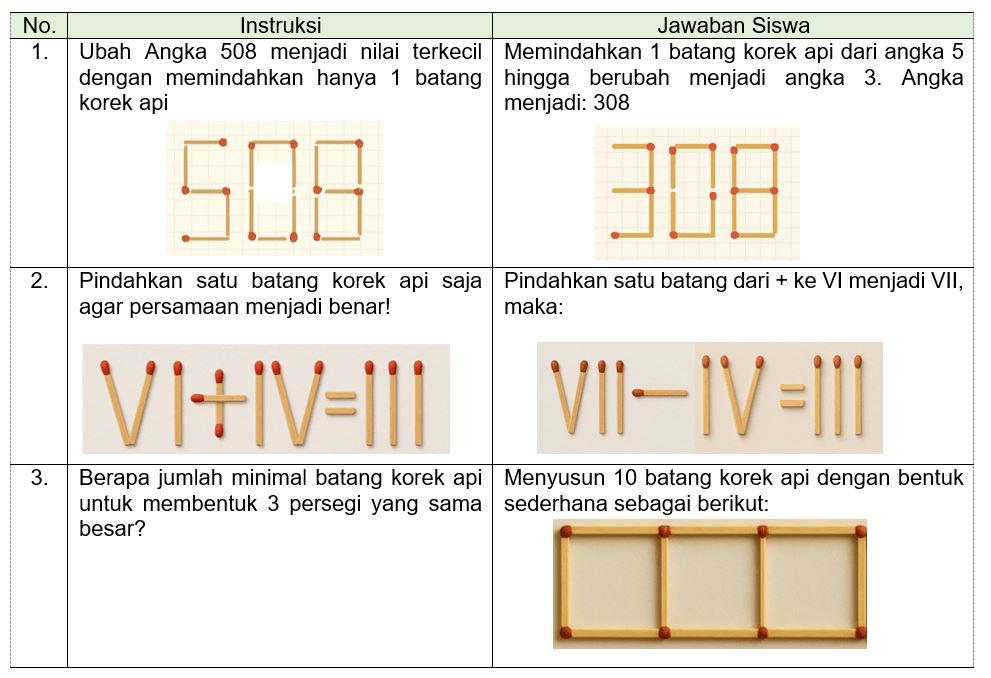TEKA-TEKI KOREK API UNTUK MENGEMBANGKAN KEMAMPUAN BERPIKIR LOGIS MATEMATIS SISWA
Keywords:
Logical, Mathematical, Matchsticks, Puzzles, ThinkingAbstract
Introducing the use of matchstick puzzles in developing students' mathematical logical thinking abilities can be supported by active learning theory and 21st-century skill development. Based on recent research, active learning involving problem-solving tasks, exploration of ideas, and effective collaboration has been proven to increase student engagement in mathematics learning. This community service activity took place on July 7, 2024, for 2 hours, with the participation of 25 elementary school children who live in Kayu Aro Ambai Village, Tanah Cogok District, Kerinci Regency. This activity consists of several stages: introduction, exploration, application, and closing. The children participated in the activity with enthusiasm and joy, and were given matches as props to solve the puzzles presented to develop students' mathematical logical thinking abilities. The results of this activity are: (1) students show an increased ability to think logically, which can be seen from their speed and accuracy in completing puzzles; (2) students are more motivated to learn mathematics because this activity is packaged in a fun way; and (3) participants provide positive feedback regarding the interactive learning methods implemented.
References
Al Ayyubi, I. I., Hayati, A. F., Azizah, E. N., Herdiansyah, R., & Mirayanti, U. (2024). Pendidikan Humanis Paulo Freire Dalam Pembelajaran Matematika MI. Wulang: Jurnal Pendidikan Guru Madrasah Ibtidaiyah, 1(1), https://doi.org/1-15. 10.55656/wjp.v1i1.178
Defrian, A., & Nasution, E. Y. P. (2023). Analisis Kemampuan Berpikir Logis Matematis Siswa Kelas Vii Mtss Almukhtariyah Ambai dalam Menyelesaikan Masalah Matematika. Jurnal Pendidikan Matematika, 99-106. https://doi.org/10.18592/jpm.v10i2.8251
Faridah, Z., & Muzakki, A. (2024). Strategi Meningkatkan Potensi Kecerdasan Visual-Spasial Peserta Didik di Tingkat Sekolah Dasar. Madrasah Ibtidaiyah Education Journal, 2(1), 22-31. https://doi.org/10.63321/miej.v2i1.40
Handican, R., & Nasution, E. Y. P. (2023). Mobile Technology-Based Instructional Edutainment Media" Number Game" to Improve Mathematical Conceptual Understanding. Jurnal Edutech Undiksha, 11(1), 119-127.
Iqbal, M., Rahayu, S., & Herdiawan, T. (2020). Rancang Bangun Sistem Pembelajaran Game Edukasi Berbasis Web Guna Meningkatkan Ranah Psikomotorik Pada Mata Pelajaran Matematika di Level SMP. Jurnal CoreIT, 6(1). https://doi.org/10.24014/COREIT.V6I1.9115
Laswadi, L., Handican, R., & Nasution, E. Y. P. (2023). Instructional Edutainment Media" Number Game" Based on Mobile Technology to Improve Mathematical Conceptual Understanding. Jurnal Edutech Undiksha, 11(1), 119-127. https://doi.org/10.23887/jeu.v11i1.53913
Leikin, R. (2016). Challenging mathematics tasks for problem-solving. Springer Publications.
Maharani, D. M., & Mahmudah, I. (2024). Faktor Penghambat Dalam Pembelajaran Matematika Kelas VI di MIN 3 Palangka Raya. ELSCHO: Jurnal Pendidikan Guru Sekolah Dasar, 2(1), 1-6. https://journal.uir.ac.id/index.php/elscho/article/view/14669
Mead, G. H. (2015). Mind, self & society. University of Chicago press.
Nasution, E. Y. P., & Kartika, P. (2022). Perilaku Hidup Sehat Masyarakat Desa Siulak Kecil Mudik dalam Upaya Pencegahan Penularan Virus Corona. JPM (Jurnal Pemberdayaan Masyarakat), 7(2), 847-855. https://doi.org/10.21067/jpm.v7i2.5911
Sari, N. A., & Nasution, E. Y. P. (2023). Analisis Kemampuan Berpikir Aljabar Siswa Kelas IX A SMP Negeri 12 Kota Sungai Penuh Pada Materi SPLDV. Jurnal Riset Pembelajaran Matematika, 5(2), 111-116. https://doi.org/10.55719/jrpm.v5i2.580
Saltifa, I., & Nasution, E. Y. P. (2021). Program bimbingan belajar bagi siswa sekolah dasar pada masa pandemi covid-19 di Desa Paling Serumpun. Altruis: Journal of Community Services, 2(3). https://doi.org/10.22219/altruis.v2i3.17476
Siregar, N. F., & Nasution, E. Y. P. (2019). Pembelajaran matematika berbasis higher order thinking skills. In Curup Annual Conference on Math (CACM) (Vol. 1, No. 1, pp. 21-26). http://prosiding.iaincurup.ac.id/index.php/cacm
Vale, I., & Barbosa, A. (2021). Active learning strategies for effective mathematics teaching. European Journal of Science and Mathematics Education.
Veronica, D., & Nasution, E. Y. P. (2022). Program bimbingan belajar (Bimbel) matematika untuk siswa SD di Desa Semerap pada era pandemi Covid-19. Madani: Indonesian Journal of Civil Society, 4(1), 1-8. https://doi.org/10.35970/madani.v1i1.771
Wang, Y., Chen, A., Schweighardt, R., Zhang, T., Wells, S., & Ennis, C. (2019). The nature of learning tasks and knowledge acquisition: The role of cognitive engagement in physical education. European Physical Education Review, 25(2), 293-310. https://doi.org/10.1177/1356336X17724173
Yunisca, L. D., & Nasution, E. Y. P. (2023). Kemampuan Berpikir Logis Matematis Siswa Sekolah Menengah Pertama. Plusminus: Jurnal Pendidikan Matematika, 3(2), 235-240. https://doi.org/10.31980/plusminus.v3i2.1339












